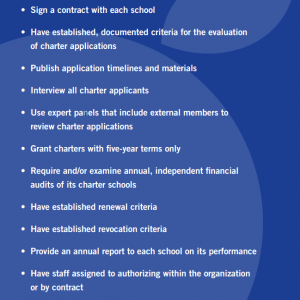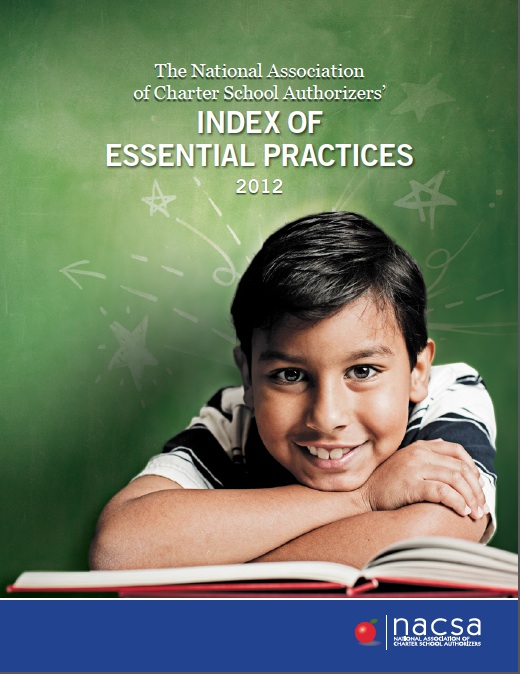This week NACSA released the second edition of its Index of Essential Practices. The Index articulates a set of practices for authorizers that can significantly improve the quality of their work—and in turn the quality of the charter schools in their portfolios. The 2012 Index also includes data on individual authorizer practices as reported in NACSA’s annual survey.
Derived from the five domains of effective authorizing outlined in NACSA’s Principles & Standards for Quality Charter School Authorizing, the 12 essential practices of charter school authorizing are grounded in three Core Principles that guide this work:
• Maintain high expectations for student achievement and school performance
• Protect school autonomy
• Protect student and public interests
These Core Principles should inform and guide authorizers’ work in the five fundamental domains of authorizer responsibility:
• Agency commitment and capacity
• Application process and decision making
• Performance contracting
• Ongoing oversight and evaluation
• Revocation and renewal decision making
Drawing from each of these five domains, NACSA created a 12-point Index of specific practices recommended for all authorizers:

1. Sign a contract with each school.
2. Have established, documented criteria for the evaluation of charter applications.
3. Publish application timelines and materials.
4. Interview all charter applicants.
5. Use expert panels that include external members to review charter applications.
6. Grant charters with five-year terms only.
7. Require and/or examine annual, independent financial audits of its charter schools.
8. Have established renewal criteria.
9. Have established revocation criteria.
10. Provide an annual report to each school on its performance.
11. Have staff assigned to authorizing within the organization or by contract.
12. Have a published and available mission for quality authorizing.
This video shows the relationship between NACSA’s Core Principles, the five domains of authorizer responsibility, and the 12 essential practices.
[hana-flv-player video=”https://qualitycharters.org/wp-content/uploads/2013/03/NACSAQualityAuthorizing.flv” width=”620″ description=”” player=”5″ autoload=”true” autoplay=”false” loop=”false” autorewind=”true” splashimage=”https://qualitycharters.org/wp-content/uploads/2013/03/Quality-Charter-School-Authorizing161-300×154.jpeg” /]
The Index was based on stakeholder input, practice in the field, and research conducted internally and in partnership with other organizations. It primarily addresses practices that support accountability and achievement, but also describes the policies and procedural steps that must be in place for strong accountability to take hold:
• Transparency in decision making
• Respect for the promised autonomy of charter schools
• Responsible stewardship for public resources
The Index is informed by NACSA’s annual survey, which in 2012 covered 157 active authorizers, both large and small. This report presents findings for individual authorizers, arranged in state-by state tables. An overall Index score is compiled by awarding one point for each of the 12 essential practices each authorizer reports. The tables also show changes since the 2011 survey. A companion report, The State of Charter School Authorizing 2012, will be released shortly. It will contain aggregated results of our entire authorizer survey, showing patterns in adoption of essential practices, new data on charter school openings and closures, and other indicators of progress in the authorizing profession.



